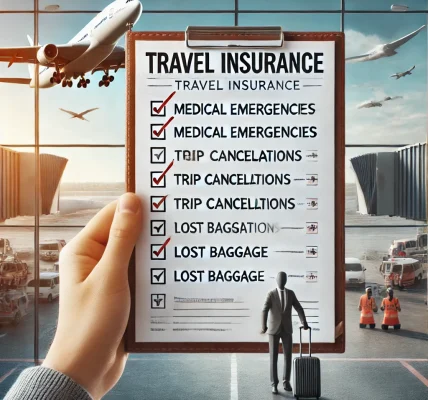Introduction
When planning a trip, protecting yourself financially against unexpected events is essential. Many travelers assume their credit card’s travel benefits are enough, while others invest in standalone travel insurance. But which option truly offers better protection?
In this detailed comparison, we’ll break down the differences between travel insurance and credit card coverage, their benefits and limitations, and which one you should choose based on your travel needs.
Understanding Travel Insurance
What is Travel Insurance?
Travel insurance is a policy that provides financial protection against various travel-related risks, such as trip cancellations, medical emergencies, lost luggage, and more. It is purchased separately from a third-party provider and can be customized based on travel needs.
Key Benefits of Travel Insurance:
- Trip Cancellation & Interruption Coverage – Reimburses non-refundable expenses if your trip is canceled due to covered reasons (e.g., illness, severe weather, or job loss).
- Emergency Medical & Evacuation Coverage – Covers medical expenses incurred abroad, including hospitalization and emergency evacuation.
- Baggage Loss & Delay Protection – Reimburses you if your luggage is lost, stolen, or delayed.
- Flight Delay & Cancellation Coverage – Compensates for additional expenses due to airline delays or cancellations.
- 24/7 Travel Assistance – Provides emergency assistance services, including medical referrals and legal help.
Understanding Credit Card Travel Coverage
What is Credit Card Travel Coverage?
Many credit cards, especially premium travel cards, offer some level of travel insurance coverage as a built-in benefit. This coverage is often limited to cardholders who purchase travel expenses using the card.
Key Benefits of Credit Card Travel Insurance:
- Trip Cancellation & Interruption Coverage – Provides reimbursement if your trip is canceled or interrupted for covered reasons.
- Rental Car Insurance – Offers collision and damage waiver for rental cars booked with the card.
- Baggage Protection – Covers lost or delayed luggage but with limited payouts.
- Purchase & Fraud Protection – Covers eligible purchases against damage or theft within a specified period.
- Emergency Assistance & Concierge Services – Some premium cards offer limited emergency support and concierge services for travelers.
Travel Insurance vs. Credit Card Coverage: Key Differences
| Feature | Travel Insurance | Credit Card Coverage |
|---|---|---|
| Trip Cancellation | ✅ Comprehensive coverage | ✅ Limited coverage |
| Medical & Evacuation | ✅ Covers hospital & emergency evacuation | ❌ Rarely included |
| Baggage Loss & Delay | ✅ Higher reimbursement limits | ✅ Lower limits |
| Rental Car Insurance | ✅ Optional add-on | ✅ Included with certain cards |
| Flight Delay Coverage | ✅ Available with some plans | ✅ Limited reimbursement |
| 24/7 Assistance | ✅ Included | ✅ Limited, varies by card |
Pros and Cons of Each Option
Travel Insurance Pros:
✔ Comprehensive coverage for medical emergencies, trip cancellations, and lost baggage. ✔ Customizable policies based on trip needs. ✔ Provides higher reimbursement limits. ✔ Covers international travel with no restrictions.
Travel Insurance Cons:
✖ Requires an additional cost. ✖ Some policies have exclusions and claim requirements.
Credit Card Coverage Pros:
✔ Included with premium travel credit cards at no extra cost. ✔ Provides coverage for rental cars and trip delays. ✔ No need to purchase a separate policy.
Credit Card Coverage Cons:
✖ Limited medical and emergency evacuation coverage. ✖ Coverage applies only if travel is booked with the card. ✖ Lower reimbursement limits for lost luggage and trip cancellations.
Which One Should You Choose?
Choose Travel Insurance If:
- You want comprehensive coverage, especially for medical emergencies.
- You are traveling internationally where medical costs can be high.
- Your trip includes non-refundable expenses such as flights, hotels, and tours.
- You want flexibility in coverage regardless of how you pay for your trip.
Choose Credit Card Coverage If:
- You have a premium travel credit card with strong travel benefits.
- You are going on a short domestic trip where medical emergencies are less concerning.
- You primarily need rental car coverage and trip delay protection.
- You don’t want to spend extra money on separate travel insurance.
Final Verdict
While credit card travel insurance provides some benefits, it is not a complete substitute for standalone travel insurance. If you seek full protection against medical emergencies, cancellations, and lost baggage, travel insurance is the better choice. However, if you’re only looking for basic protection and already have a premium travel credit card, its built-in travel benefits might be sufficient.
Ultimately, the best choice depends on your travel plans, destination, and risk tolerance. Before making a decision, carefully review your credit card’s policy details and compare them with travel insurance options to ensure you have the coverage you need.




